How To Get Stuff Done Even When You Don’t Feel Like It
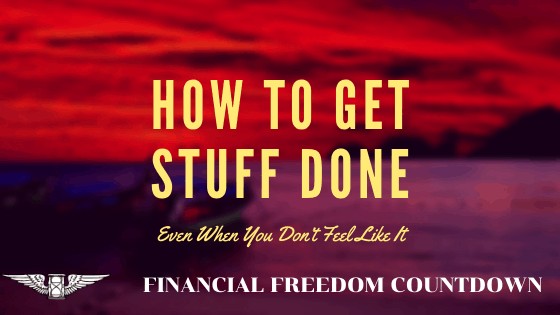
As the New Year has dawned, many of us will have set New Year resolutions or goals. Most of the resolutions are audacious and we want to make sure we accomplish them before the end of the year. The challenge is to get stuff done even when you don’t feel like it.
What Is Decision Fatigue?
Decision fatigue is a well-documented phenomenon which indicates our ability to make good decisions deteriorates after a long session of decision making.
A study was conducted where researchers examined 1,112 judicial rulings over a 10-month period by eight judges who presided over two different parole boards that serve four major prisons. All of the rulings were made by a parole board judge. The judges’ decisions were classified into two categories, “accept request” and “reject request.”
Now, you might be correct to assume that the judges were influenced by the actual merits of the case.
However, the researchers found that the choices made by judges are impacted most by how many prior decisions they have had to make.
What the researchers found was that at the beginning of the day, a judge was likely to rule favorably about 65 percent of the time. However, as the hours progressed and the judge became drained from making more and more decisions, the likelihood of getting a favorable ruling steadily dropped to zero.
After taking a food break, however; the judge would return refreshed and the likelihood of a favorable ruling would immediately jump back up to approximately 65 percent. And then, as the day continued, the percentage of favorable rulings would fall back down to zero by the end of the day.
This trend held true and indicated that every judge in the sample was more likely to rule in favor of a prisoner at the beginning of a session than at the end of a session. Researchers refer to this phenomenon as “decision fatigue”. When the judges on the parole board experienced decision fatigue, it was easier for them to deny parole and rule in favor of the status quo.
Why Is The Decision Fatigue Research Important For You?
The practical application of this research is that your willpower is like a muscle. And just like any other muscle which experiences fatigue after a few sets; your willpower can get fatigued when used consecutively over and over again without a break.
Decision fatigue happens to all of us every day in our lives. Most days we are faced with thousands of decisions; ranging from something as small as what should I wear today; to bigger life changing decisions.
[bctt tweet=”As a result of the constant decision making throughout the day, we feel mentally exhausted by the end of the day to make good decisions.” username=”FFCsocial”]
Listen to why Facebook Founder and CEO Mark Zuckerberg wears the same T-shirt every day.
“I really want to clear my life to make it so that I have to make as few decisions as possible about anything; except how to best serve this community”
We want to cook a healthy meal or go to the gym or work on an important personal task; but our mental bandwidth is exhausted. We default to sitting on the couch watching TV or scrolling aimlessly through our social media feed.
Another day goes by and we have procrastinated again without figuring out how to get ahead in life. This is why I don’t recommend wasting precious mental energy over the decision to buy coffee and instead conserve it for bigger and better activities.
When I looked at the challenges people face; the data indicates people are searching for motivation to get stuff done and wondering why can’t I get stuff done
Everyone is searching various variants of these questions
How to focus and get things done
How to get stuff done when you don’t feel like it
How to get stuff done with ADHD
How to get stuff done after work
How to get stuff done at work
How to get stuff done when you have ADD
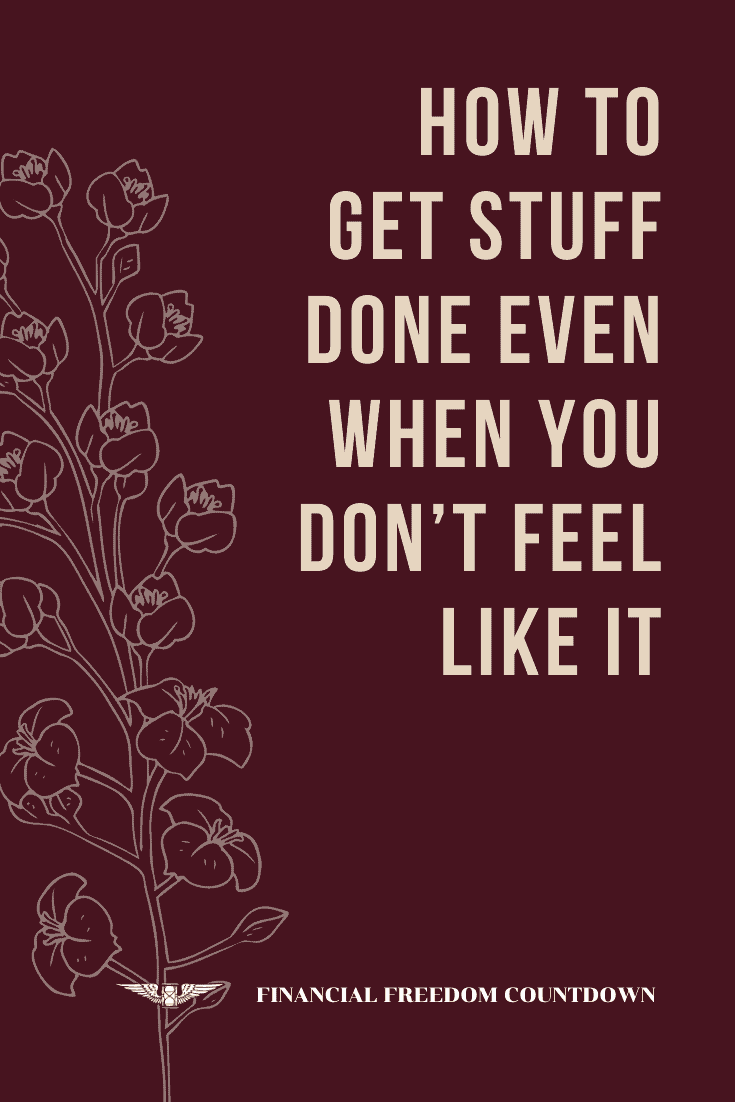
Action Steps On How To Get Stuff Done
-
Define WHAT you want to achieve in the next 12 months.
This could be anything from health to investing to a personal project. The goal is important because you want to make sure you have a true north as your guiding light.
-
Define WHY you want to achieve it.
Things will get tough. If you define your WHY; it will help you stay focused. Don’t stop at the first why but instead dig deeper with additional why questions.
-
How would you achieve this goal?
Break down your larger goal into bite size pieces.
In the book “How to Eat an Elephant” Frank Wiginton highlights the ”one bite at a time” technique. Any large task will seem overwhelming at first. Therefore, you have to break it down into weekly or daily activities.
-
-
Automate Repetitive tasks
-
Once you have broken your goals into discrete bite size pieces; figure out if it can be automated. If yes, then go ahead and automate the task. Automation of investment not only avoids decision fatigue preventing you from getting started with investment; but it also saves your mental bandwidth and cognition for tasks which require your concentration. You can use your mental energy on improving your human capital and earning more money
-
-
Tasks which need concentration – Deep Work
-
Cal Newport coined the term “Deep Work” in his book to highlight tasks which require concentration. He explains that these tasks are the ones where you use your brain power to produce original content, analysis, studying etc. Due to the mind losing its ability to concentrate later in the day; make sure you schedule these tasks first in the morning at the start of your day; and after breaks so your brain cells are not tired.
-
-
Tasks which are unpleasant and require a lot of will power – Frogs
-
These tasks should also be done first thing in the morning. Mark Twain once said “If it’s your job to eat a frog, it’s best to do it first thing in the morning. And if it’s your job to eat two frogs, it’s best to eat the biggest one first.”
The frog is a metaphor for the one thing will have the most impact on your life. It is most likely something that you know you have to work on but lack the motivation to do and have kept it on the someday “to-do” list for too long. Eating the frog means to just do it and not end up procrastinating over it. Doing it first thing in the morning means that you will not suffer from Decision Fatigue; and can complete the task or at least make measurable progress on it.
The advantage of eating the frog in the morning is that once that one task is done, the rest of the day will be a smooth ride. You have accomplished the most difficult and impactful activity and now even if you just cruise through the rest of your day; you will be much further along compared to other days where you are constantly bouncing around from one action to the next trying to keep your head above water.
If we can accomplish the task we have always wanted to achieve right in the morning, then the rest of the day will be great. You will have a sense of accomplishment to kick start your day and you will gain momentum. This is the same concept used in the best seller The One Thing
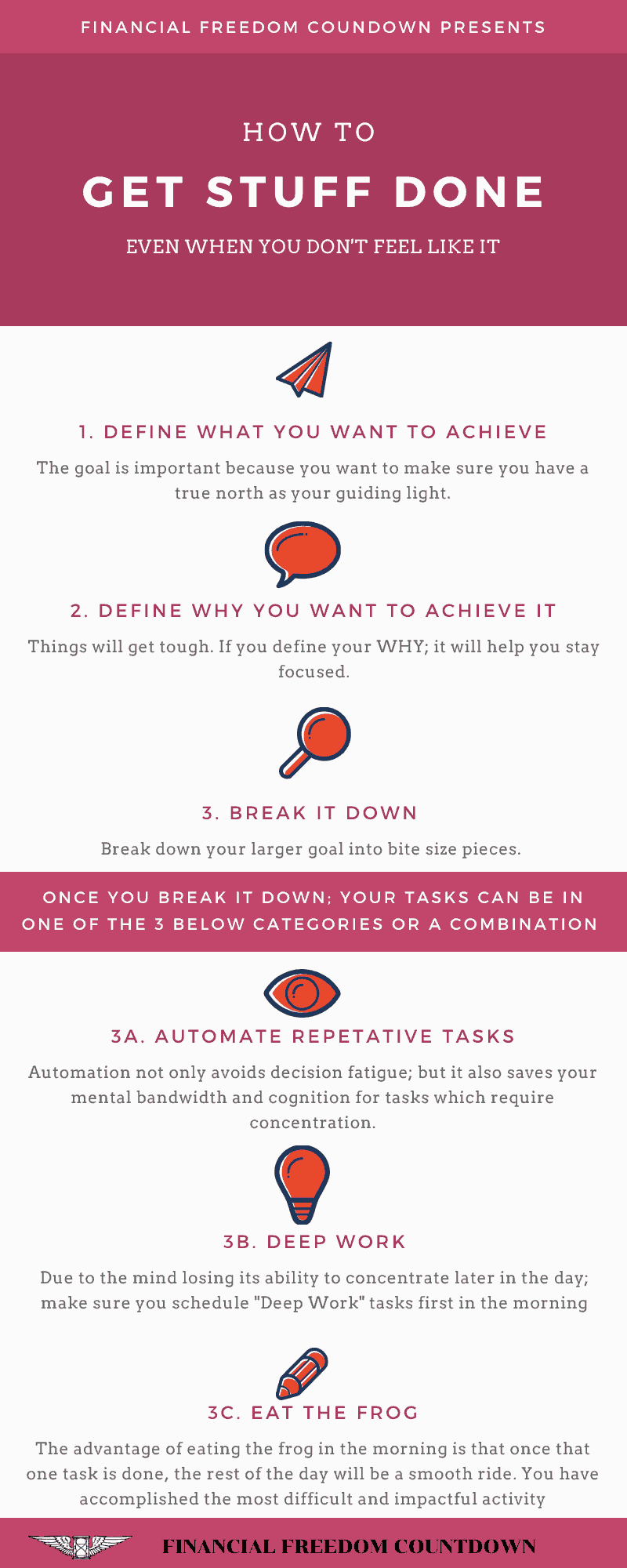
Financial Example On How To Get Stuff Done
- What: I want to invest an additional $10,000 this year.
- Why: So it can accelerate my Financial Freedom Countdown which enables me to spend more time with my family and friends.
- Break it down: $10,000 a year is only $192/week. I have only spare $50/week in my budget so need to figure out how to get the additional $142/week. The additional $142/week can only come if I switch jobs or upgrade my skills at the current job.
- Automate investing the $50/week. I prefer no fee set it and forget it method of M1 Finance. My review is here.
- Devote an hour a day right after you wake up to learn the new skill (Deep Work) or apply for jobs (Unpleasant tasks) or do both.
Fitness Example On How To Get Stuff Done
- What: Lose 12 lbs of body weight in a year.
- Why: So I can look good, health reasons, anything which is your motivating factor.
- Break it down: 12 lbs a year is only 0.25 lb/week. Fat loss has 2 components – diet and exercise
- Automate the diet part by using meals from Weight Watchers, Jenny Craig or something as simple as MyPlate.
- Exercise can’t be automated but you can setup systems such that the habit is ingrained. Eliminate any barriers by choosing a gym close to home or on your route from home to work.
Go to bed in your gym clothes. Seriously try this out! When you wake up you are ready to go. If you don’t like sleeping in your gym clothes; at least keep your gym bag, shoes, etc at the foot of your bed every night so you eliminate any barrier with respect to finding stuff which would hamper your gym routine.
Form a habit of stopping by the gym before heading to work; even if it is for 15 min workout. Once you are there; you can plan to stay for longer. My friend would follow this approach and over a period of time, going to the gym became second nature like brushing his teeth. He now loves it more than anything else.
You can even join one of those free classes to get started. It will help you establish a routine and you will make friends at the gym and be motivated to go regularly to meet them.
Summary
In order to get stuff done you need to define clearly what you want to achieve, why you want it and how you will get there by breaking it down. Then automate tasks and focus of the “Deep work” and “frogs” early in the morning.
Readers, have you found any other ways to effectively get things done. What is on your list to accomplish this year?

John Dealbreuin came from a third world country to the US with only $1,000 not knowing anyone; guided by an immigrant dream. In 12 years, he achieved his retirement number.
He started Financial Freedom Countdown to help everyone think differently about their financial challenges and live their best lives. John resides in the San Francisco Bay Area enjoying nature trails and weight training.
Here are his recommended tools
Personal Capital: This is a free tool John uses to track his net worth on a regular basis and as a retirement planner. It also alerts him wrt hidden fees and has a budget tracker included.
Platforms like Yieldstreet provide investment options in art, legal, real estate, structured notes, venture capital, etc. They also have fixed-income portfolios spread across multiple asset classes with a single investment with low minimums of $10,000.

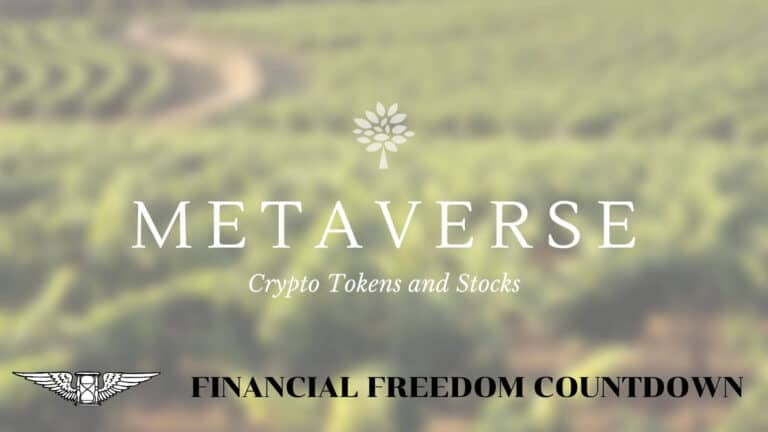
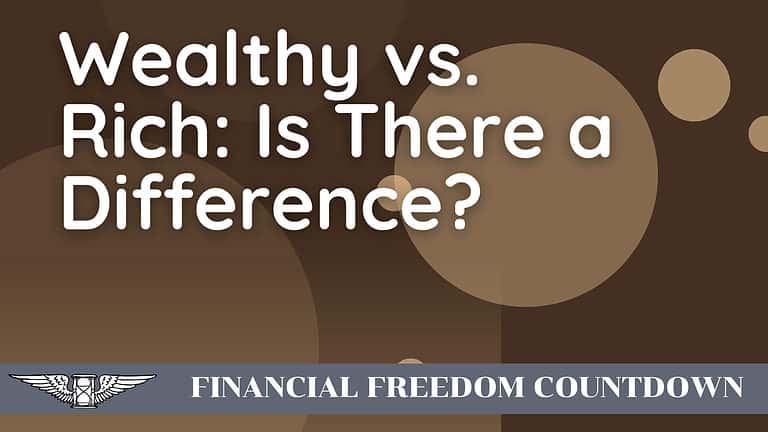
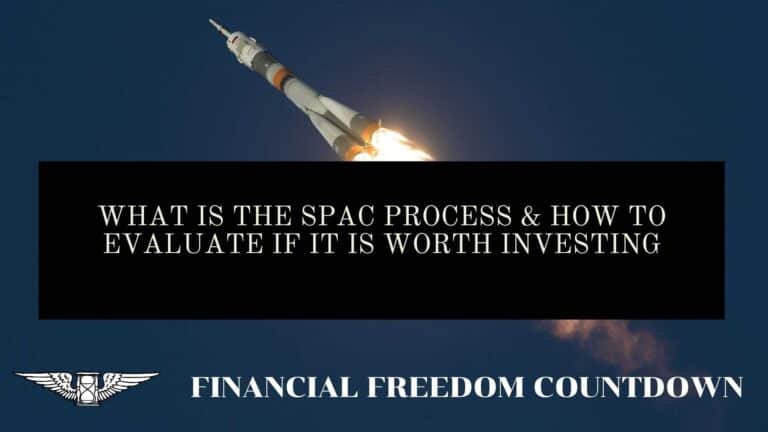


Fantastic graphic FYI. Good post FFC 🙂
Never heard of the saying: eating the frog! Interesting stuff.
I guess Mark Twain did not like frogs haha